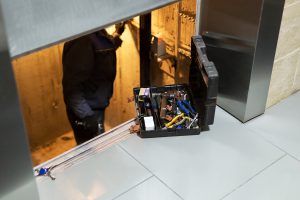According to statistics compiled a few years ago, elevator and escalator accidents seriously injure about 17,000 each year, killing roughly 30.
A recent headline was a reminder of that, as a nurse nearly died as a result of a malfunctioning elevator. The accident, reported by NBC DFW, occurred outside Louisiana, but it just as easily could have happened here. The nurse entered an elevator one day at work on the tenth floor of her hospital in Fort Worth, Texas. The elevator continued moving after it should have stopped. The nurse’s foot became trapped and, ultimately, the elevator crushed the nurse. The nurse managed to survive but spent a month in a coma. The elevator accident inflicted massive internal injuries and also left the nurse with brain damage. According to the NBC DFW report, the nurse “is expected to have a long-term recovery from injuries that are expected to impact her throughout her life.”
When you find yourself (or a loved one) hurt because an elevator didn’t function as it should have, there are many different directions that the facts you discover may take you. Many of these, however, will have one thing in common, which is that someone was negligent, and that wrongful action or inaction had a direct link to the harm you suffered.
Many types of negligence can result in an elevator accident injury
For example, with the help of your legal team, you may discover that the elevator in question was not inspected nearly as frequently as it should have been. When that happens, you may have a negligence case against the entity responsible for the elevator, whether that entity is the building’s owner or perhaps is a tenant. The case against that entity would potentially entitle you to compensation based upon the owner/tenant’s negligent failure to have the elevator inspected and keep it maintained in a safe working condition, which Louisiana law requires.
In other circumstances, the entity that is most directly negligent may be neither an owner nor a tenant of the building. Sometimes, an outside firm is retained to provide inspection and maintenance services. For example, in the Texas accident, the hospital had contracted with an outside entity to inspect and maintain its elevators. The elevator that injured the nurse malfunctioned as a result of brake failure, according to state inspectors. Specifically, the elevator had worn-out brake shoes that caused the elevator to fail to “set firmly.” That failure was what caused the elevator to keep moving and crush the nurse.
The evidence the inspectors uncovered was very telling. The agency’s report stated that “worn brake shoes and frozen pins illustrated a lack of routine maintenance and equipment checks” and also that the elevator showed “no visible signs of lubrication on the brake sleeve and core after the accident,” according to NBC DFW. When you have evidence like that, then you may have the foundation of a very strong case that the contractor firm did not live up to the applicable standard of care, meaning that it was negligent and liable for your injuries.
Not all errors are mere negligence; sometimes, the misconduct is more egregious
While many cases involve negligent missteps, not all are solely negligence actions. Sometimes, there’s more. “More” may mean a building owner that knew that its elevator was malfunctioning but refused to get it checked and repaired. Alternately, “more” may mean a maintenance contractor that knew that it was not inspecting its clients’ elevators thoroughly enough but continued to allow the insufficient inspections to happen because they were more economical for the contractor’s “bottom line.” When these things happen, you may have a case of willful misconduct, which may allow you to obtain additional compensation, such as punitive damages.
All the above things are some of the “nuts and bolts” of how the legal system can work in this type of circumstance. You don’t really need to memorize all the details of negligence law in Louisiana. What you really do need to remember, though, is that, if you’re hurt in an elevator accident in Louisiana, you have options under the law. Act promptly to retain counsel and find out more about what you can do. The Cardone Law Firm and our highly experienced Louisiana premises liability attorneys are here to help with that. We have many decades of experience handling a full range of accidents, including elevator accidents. We have the skill and experience to get results for our clients.
For your confidential consultation contact us online or phone Cardone at 504-522-3333.
 Louisiana Injury Lawyers Blog
Louisiana Injury Lawyers Blog


